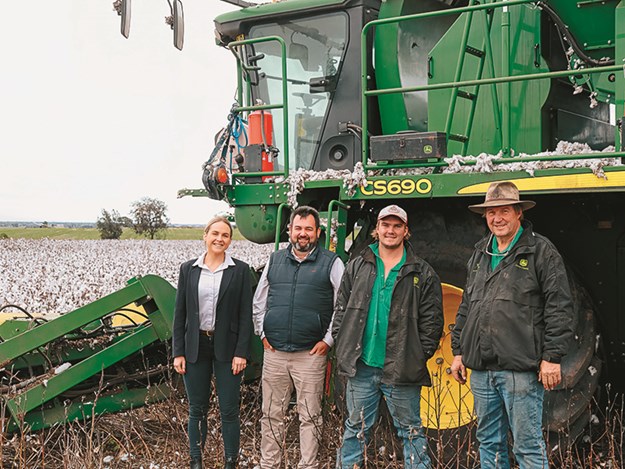A flexible, tailored and longer-term finance solution from NAB has given contractor BMC Partnership the confidence to invest in equipment
Every business relies on having the right equipment at the right time to operate effectively. In agricultural businesses, the right equipment is often expensive and long-term in nature. Financing the purchase of such assets can also be complicated.
NAB Equipment Finance Specialist Charlie Coote says agribusinesses today face two major challenges in financing equipment purchases: the rising cost of new technology; and supply constraints, which mean equipment must be ordered much further in advance.
“Our clients need to be more prepared and strategic with planning for major capital purchases,” Charlie says.
 |
|
Liberty Walker, NAB Agribusiness Manager Moree NSW; Charlie Coote, NAB Equipment Finance Senior Specialist, Northern NSW; Scott and Ross Munro from BMC Partnership, Moree NSW
|
Experience in the field
The need for forward planning is something BMC Partnership’s Ross Munro knows well.
BMC Partnership is a large contract cotton stripping, picking, manufacturing and transportation business based in Moree in northern NSW.
Ross heads the business and his son, Scott, runs the day-to-day operations. The business purchased three new cotton-picking machines for its fleet for the 2022 season, at a price of $1.4 million each. Ross had to place his order around 10 months before he needed the pickers.
“You have to say, ‘Who’s going to plant cotton? How much cotton is going to be planted?’ to make the numbers work. It’s a big call that far out,” Ross says.
The stakes are high. Some contractors who ordered late are still waiting for equipment to arrive and they risk missing the picking season. This means when the equipment does arrive, they will have to pay for it without being able to use it to generate income.
Fast, flexible finance
For Ross, access to flexible finance was the key to the success of his purchase.
BMC Partnerships has been a customer of NAB for around 20 years and Ross worked with Charlie and banker Liberty Walker on financing the purchase of the three cotton pickers. Charlie and Liberty structured the debt offer to suit the asset and its expected life span and, importantly, to ensure the debt suited the business cash flow.
Ross wanted to compare NAB’s offer to the equipment supplier’s trade finance but with the machines ordered and on their way, he was still waiting for a response.
“There was a big demand for those machines, and I knew that if I faltered there would be 30 customers who would take that machine off me,” Ross says.
“I was watching the ship on the tracker. I could see it going through the Suez Canal. It was coming past Perth, past Fremantle. I could see the deadline coming together … The next second it’s going to be here.”
As the machines neared port, the supplier’s finance offer finally came through, allowing Ross to do the comparison.
The interest rate offered by the supplier was lower than the rate offered by NAB but the terms were less flexible. NAB was able to timely provide a solution that was flexible and meet cashflow and business needs.
Ross accepted NAB’s offer based on flexibility.
“NAB was much more negotiable with the planning,” he says.
“I don’t mind paying more interest. I’m after a bank that can move when things move and change when things change.”
 |
|
One of the cotton harvesters in action
|
Support when its needed
This year, Ross is glad he went for flexibility – with widespread flooding in the Moree area halting operations in the middle of the picking season.
“I’ve got machines stuck in flood water. Nothing is picking cotton today. In my budget, I’m assuming I’m picking but I’m not. I’ve got seven machines sitting doing nothing but I’ve already thought that could happen so I’ve moved my repayment schedule into a format that will meet that need,” he says.
Liberty says the crux of the deal was NAB being able to offer a tailored solution to the customer.
“We were able to do that for Ross with those three machines, to do it quick and do it right first time,” she says.
“It’s being quick to market and then leveraging off that deep relationship with Ross over the past 20 or more years in conjunction with meeting his requirements and tailoring it to meet his business and his cash flow.”
It’s all part of maintaining customer relationships. NAB had worked with Ross’ business on complex transactions in the past and had helped him with his business succession planning.
NAB has a strong history of supporting its customers in both good and bad times. During past droughts and floods, NAB bankers have been there on the ground, speaking to clients, restructuring debt and delaying repayments on equipment finance when needed – supporting agribusinesses to carry on with one less thing to worry about, as Charlie puts it.
Aside from this year’s rain and a few common teething problems, Ross is happy with his cotton pickers.
“There was a lot of work we had to do with them to get them up to full steam, but they’re humming along now,” he says.
 |
|
Flexible finance meant repayments could be modified for widespread floods and a halt in operations
|

